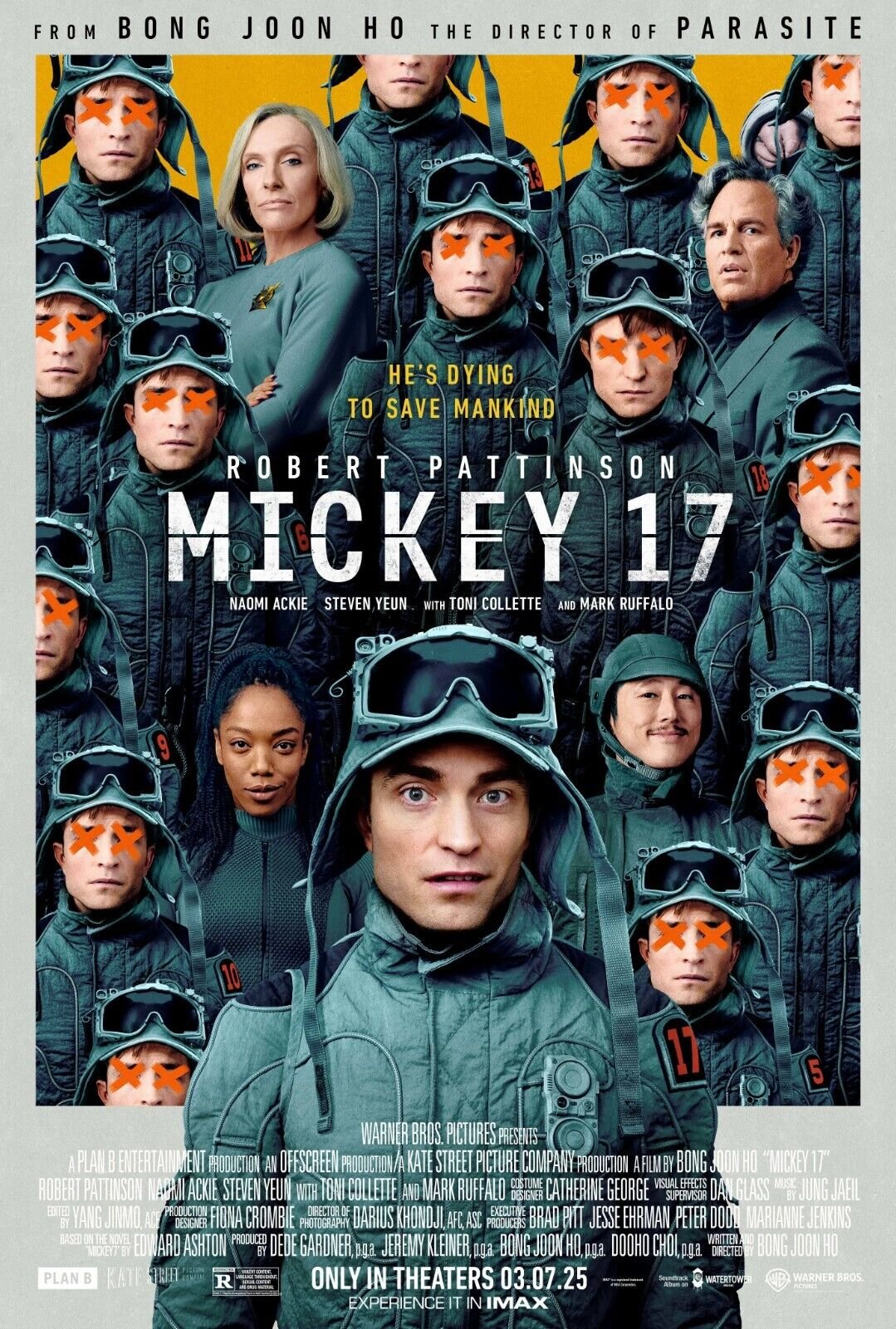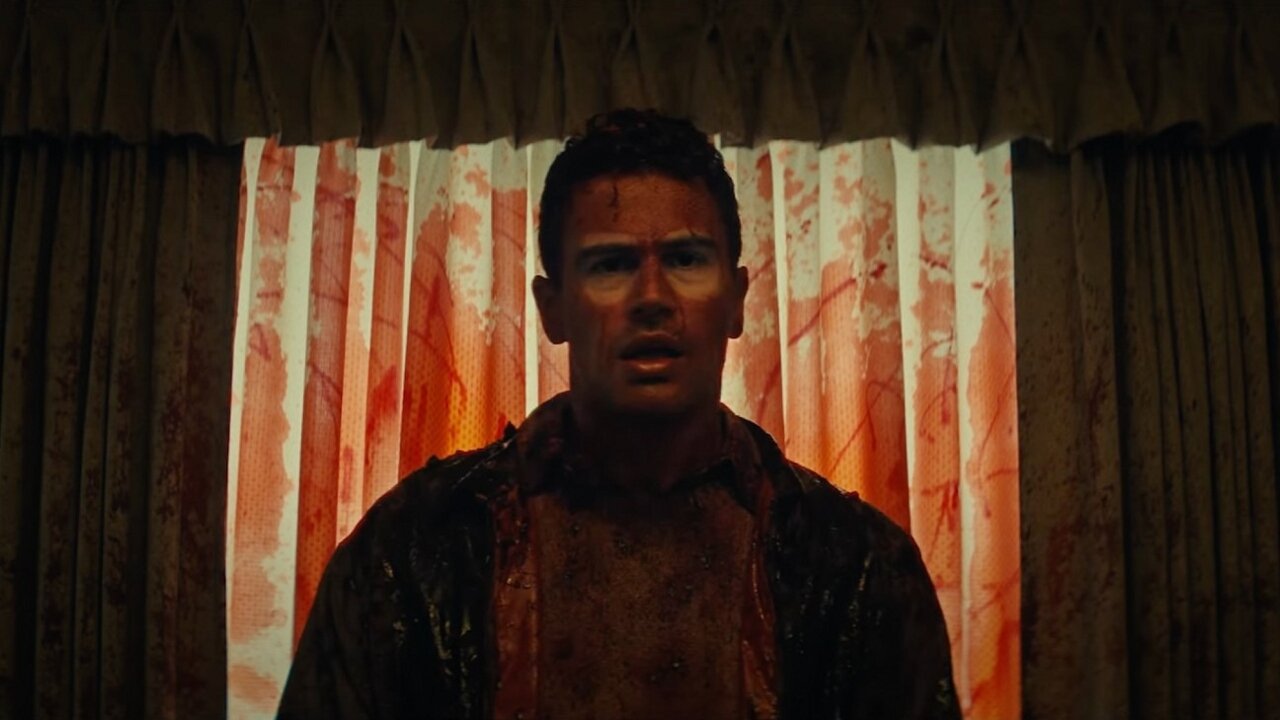Mickey 17
If you vote for me, my first rule would be to make Robert Pattinson printable for everyone.
Bong Joon Ho's Mickey 17 arrives with the weight of massive expectations. It's his first film since the phenomenon that was Parasite, and with Robert Pattinson in the lead, anticipation in my house was through the roof. Now, it's finally here, and we get to see what a big budget looks like in the hands of Bong Joon Ho.
At its core, Mickey 17 is a sci-fi story about Mickey Barnes, a man who joins a deep-space colonization mission alongside a disgraced politician and his fanatical followers. Unlike the rest of the crew, Mickey isn’t there out of loyalty; he’s running from his problems on Earth. Due to his own lack of awareness, he accidentally signs up as an "Expendable"—a human test subject whose body and consciousness can be scanned, replicated, and reprinted after each death. This makes him functionally immortal but also completely replaceable. Each iteration of Mickey retains his memories, updated weekly, but with slight variations—some versions are dumber, angrier, or more sentimental than others. The plot thickens when one of his past iterations, believed to be dead, reappears on the ship, leading to an existential crisis and an identity struggle.
Bong Joon Ho divides the film into two key narratives. The first is Mickey’s personal journey—an exploration of a man who has spent his entire life believing he is unworthy of empathy, dignity, or basic human decency. His acceptance of the Expendable role is, in many ways, a form of self-inflicted punishment. The second layer of the film, as expected from Bong, is a biting political satire.
Let’s be clear: Mickey 17 is how America looks through foreign eyes. Despite Bong Joon Ho writing the script in 2021 and insisting that it wasn’t inspired by any real-world figures, it takes zero effort to recognize who Mark Ruffalo’s character, Kenneth Marshall, is meant to represent. A failed politician who escapes his downfall on Earth to lead a cult-like group on a distant planet? The red hats worn by his followers? His manner of speaking? If you don’t see the connection, watch the movie again. The parallels are uncanny—especially when you consider a scene in which an assassination attempt on Marshall results in a minor wound, eerily reminiscent of the recent real-life attempt on Donald Trump’s life. It may be coincidental, given that the movie was shot before the actual attack, but it’s impossible to ignore.
True to Bong’s style, Mickey 17 is also a commentary on class disparity and the nature of power. It highlights how the ruling elite views not just one man but entire societies as expendable—just the tools to be discarded in pursuit of their ambitions. It’s about the dangers of blind allegiance, the way people shut off critical thinking in exchange for a sense of belonging, and how individuals like Mickey, naive but inherently good-hearted, get swallowed by the system. Mickey-18, a more cynical and hardened version of the protagonist, ultimately becomes the film’s whistleblower—someone willing to sacrifice himself for the greater good.
Beyond its thematic depth, the film remains an engaging and often humorous sci-fi adventure. The concept of interplanetary colonization, the clash with the planet’s inhabitants (who were never hostile to begin with), and the exploration of coexistence rather than conquest all add layers. It’s a reminder that society doesn’t need egotistical strongmen to thrive—it needs cooperation.
The cast is great. Robert Pattinson fully embodies the awkward, slightly dim-witted yet well-meaning Mickey, a man who has long since given up on himself but eventually learns that he, too, deserves happiness. Naomi Ackie shines as the pragmatic enforcer of the system, someone who understands its absurdity yet chooses to be a part of it. Mark Ruffalo plays his role with a mix of absurdity and menace, while Toni Collette, as his vacant wife, adds to the satire. Steven Yeun’s character, a supposed friend of Mickey, serves as a reminder of self-interest and betrayal—someone who will sacrifice any version of Mickey to save himself.
Ultimately, Mickey 17 is a sharp, witty, and timely critique of modern politics, wrapped in an inventive sci-fi premise. While it may have initially been conceived as a satire of a fallen leader, reality unfortunately shifted, and the film’s message evolved into something more urgent—less of a post-mortem and more of a warning about what happens when people stop thinking for themselves and fall into the hands of an egomaniac and his inner circle.
8/10




